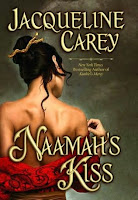 331 pages, Historical Fiction
331 pages, Historical FictionThe Queen's Dollmaker is the story of the life and love of Claudette Laurent, a French woman making her living as a doll maker in England, during the French revolution. The story begins with young Claudette, still living in France, having a chance meeting with young Marie Antoinette, sent to France from Austria to marry the king. Claudette's initial impressions of the young princess shape her opinions of the French royalty in the years to come.
After the initial meeting with the princess, the story flashes forward to Claudette's late teen years. There is a devastating fire in the Paris quarter where she and her family live, and nearly everything in her father's doll shop burns. While the family tries to help their neighbors, Claudette's parents are killed. Penniless and now an orphan, with no friends or family to call upon for aid, Claudette finds herself wandering to the docks. There, she meets a man promising to pay the fare of any French women who want to go to England to become 'maids'. Once they are gainfully employed, they will pay him back. She is naively taken in by this offer, and boards the ship to England.
Aboard the ship, Claudette befriends Beatrice du Georges and her daughter Maguerite. Together, the three barely escape the clutches of the ship master and find themselves employed as maids by an overbearing, social climber of an English matron who both hates and exploits their nationality. Throughout this harsh employment, Claudette and Beatrice save up enough money to finally escape servitude and begin their own business making fashion dolls. Though this endeavor too has a rocky start, Claudette is eventually excels in her sphere; her dolls even catching the eye of the French monarch herself. This seemingly benign career choice leads Claudette down a path of adventure, hardship, betrayal and eventually love and redemption.
The lives of the historical figures in The Queen's Dollmaker - Marie Grosholtz, The Princess de Lamballe, Count Axel Fersen, King Louis XVI, and most notably Queen Marie Antoinette - are blended together with the fictional quite masterfully. Chapters about life at Court and Marie Antoinette's troubled monarchy and marriage mirror Claudette's difficulties. The Queen fails to understand why the people do not love her as she loves them, because she has done nothing differently from any preceding monarchs. The Queen strives to eschew the ornamentation that comes along with her station, and uses a considerable amount of money to create a pastoral life on the grounds of Versailles. This contrast with Claudette's financial struggle for independence makes the French Revolution seem inevitable.
The opulence of the wealthy; the filth, despair and wretchedness of life in a Paris prison during the revolution; the horror of the guillotine; the house arrest and murders of the royal family - all are told faithfully and from the perspectives of the true historical figures of the royalty and the fictional yet still realistic experiences of Claudette.
Not being a huge fan of historical fiction, I purposely chose a story about a period with which I was already familiar. It was very interesting to me to read about the revolution from the royal perspective as well as that of someone more common. Not that I don't understand the desire to break off the bonds of the monarchy's irresponsible leadership and oppression of the French people, but I have always been appalled by the tactics used by the revolutionaries in France. This part of the tale was very emotional for me. The fictional part of the story - Claudette's life and love - was interesting but had too much of the soap opera feel for my taste. All in all, it was an enjoyable book, but it, like most historical fiction, just made me want to read history instead. I would give it 3 out of 5 stars.


